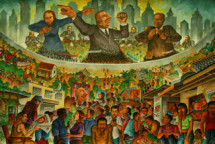There is no state: Authoritarian returns on Haiti’s high Central Plateau
Topics
Regions
How have rural dwellers understood and responded to historical and resurgent forms of authoritarian populism in Haiti’s hinterland since the 1970s?

Authors
Political and economic shocks have destabilized agrarian livelihoods in Haiti since the country won its independence from France in 1804. Yet the current conjuncture demonstrates a new convergence of ecological, economic, and political pressures in postcolonial rural spaces like Haiti’s central hinterland. Ethnographic research conducted with rural dwellers organized in the Mouvman Peyizan Papay (MPP, or Peasants’ Movement of Papaye) on Haiti’s high Central Plateau since 2013 reveals that, despite their commitment to a liberatory Marxist politics, many peasants yearn for a return to the ecological and social order that was enforced under the authoritarian Duvalier dictatorship (1957-1986).
While recent developments in Haitian national politics point to a resurgence in Duvalierist militarism and authoritarianism, MPP militants have typically not joined the anti-government mobilization that began in 2015, perceiving is as corrupted by the populism of ex-president Jean-Bertrand Aristide. Moreover, the political arm of the movement has increasingly been compelled to play gwo nèg (“big man”) politics in its effort to represent rural interests at the national scale. Peasants like those organized with MPP are thus caught between a regressive national politics and an urban-focused populist resistance that has historically sought to neutralize rural social movements. This working paper reveals how MPP militants are developing agroecology — the science of sustainable food systems — as an adaptive response to multivalent rural precarity. The political implications of an “agroecological transition” across the global South are only beginning to be examined. The emancipatory political project emergent from MPP’s turn to agroecology mobilizes agrarian knowledge production in the movement’s praxis of food sovereignty. Whereas prevailing development paradigms highlight food sovereignty as one key objective in building rural resiliency, the material and political conditions that produce rural inequality in the first place often go unquestioned. Ultimately, Towards a Political Agroecology challenges prevailing resiliency frameworks by arguing for agroecological praxis as a means of disrupting the normative reproduction of authoritarian futures in the countryside. As such, a political agroecology affords peasants a means not only to understand and intervene in changing agro-ecosystems, but also to challenge the cooptation of movement politics by authoritarian actors.
This paper was presented at the Emancipatory Rural Politics Initiative (ERPI) 2018 Conference: "Authoritarian Populism and the Rural World"